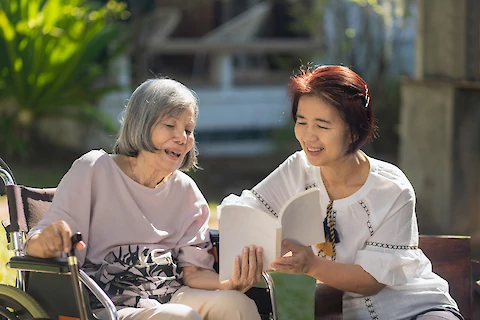
Sundowning is a common phenomenon that affects seniors in the early stages of Alzheimer's, often leading to increased confusion, agitation, and anxiety in the late afternoon and evening. Understanding and effectively coping with sundowning is crucial for maintaining a good quality of life for both the affected seniors and their families.
Here are some useful tips on self-managing and reducing the effects of sundowning, as well as the steps one can take with third parties, such as doctors and caregivers, to create a supportive environment.
What is Sundowning?
Sundowning, also known as "late-day confusion," is a symptom of Alzheimer's disease and other forms of dementia. It occurs when individuals experience increased confusion, agitation, and restlessness during the late afternoon and evening hours. Some common symptoms of sundowning include:
- Agitation
- Anxiety
- Mood swings
Several factors can contribute to the onset of sundowning, such as fatigue, low lighting, disrupted internal body clock, increased shadows, and unfamiliar surroundings. Understanding these triggers can help manage and reduce the effects of sundowning in seniors with Alzheimer's.
Self-Management Strategies for Sundowning
There are several strategies that seniors with Alzheimer's can follow to help reduce the impact of sundowning:
- Maintain a regular daily routine: Consistency is key when it comes to managing sundowning. Establishing a structured routine can help minimize confusion and anxiety during the evening hours.
- Engage in physical activity during the day: Activities like walking, gardening, or gentle exercises can help reduce restlessness and improve sleep quality at night. Check with your doctor before starting any new fitness routine.
- Limit caffeine and sugar intake: Consuming caffeine and sugar in the afternoon can affect sleep quality and contribute to increased agitation in the evening.
- Create a calm and soothing environment in the evening: Reduce noise, dim bright lights, and engage in calming activities such as listening to soft music or reading.
- Use nightlights to reduce shadows and increase visibility: Shadows can cause disorientation and anxiety in those experiencing sundowning. By using nightlights, you can make your home feel safer and more familiar.
- Keep a journal to track patterns and triggers: By noting any patterns or triggers related to sundowning, you can work on addressing these issues and potentially reduce the severity of the symptoms.
Steps to Take With Third Parties
In addition to self-management strategies, there are steps you can take with the help of caregivers, medical professionals, and family members to help alleviate the effects of sundowning:
- Inform your doctor about your sundowning symptoms: Discuss any changes in your symptoms, sleep patterns or behaviors with your doctor. They may suggest adjusting medications or exploring additional treatment options.
- Consider hiring a caregiver for companionship or an evening time slot: A professional caregiver can assist with daily tasks and ensure your safety during the times when sundowning is more likely to occur. When searching for a caregiver, it's important to find someone who is experienced in working with individuals experiencing sundowning to best meet your needs.
- Other options for support: Joining a support group can provide emotional support and practical advice from others who are also dealing with sundowning. Don't hesitate to ask friends and family members for assistance or companionship in the evening, which can help alleviate feelings of isolation and anxiety.
We're Here to Help
If you or a loved one is experiencing sundowning and require assistance in Charlottesville, Harrisonburg, Elkton, Bridgewater, Gordonsville, or Crozet, Senior Helpers Blue Ridge is here to help. Our team of professional caregivers is committed to providing compassionate and knowledgeable care to seniors with Alzheimer's and other forms of dementia. To learn more about our services, please contact us today.